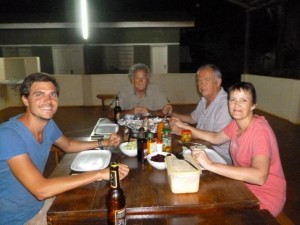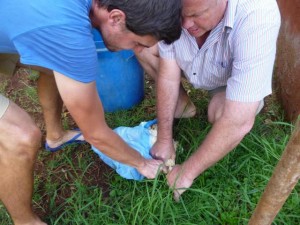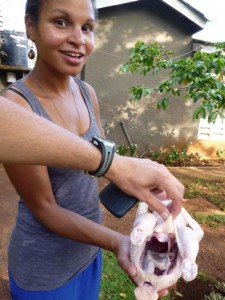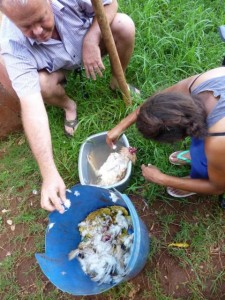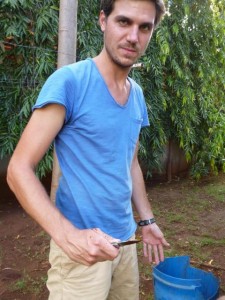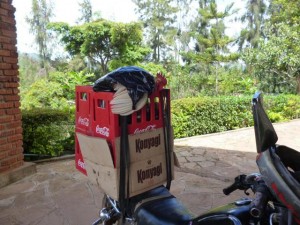One chicken to go, please
It has been awhile since you have heard from us, but this blog writer took a short break over the holidays, so we have a lot of catching up to do! I hope everybody had a warm and loving Christmas and has celebrated a great New Year. Next story will be about our travels between Rwanda and Malawi, but since this story is still in the making, I’d like to share this little chicken story with you first.
Before our trekking in the Simien Mountains in Ethiopia four three months ago, we did some major grocery shopping. We got help from a local guy who directed us from shop to shop until we had checked almost all boxes of our shopping list. Don’t get me wrong, normally we do our grocery shopping without guide, but in Ethiopia it is very difficult to see what is sold being sold: there are no signs over the door and the little food that they sell is usually stored behind the counter, invisible to clueless windowshoppers. So we needed a personal shopper 🙂
We wanted to feed our trekkingparty (the security guy, the mule man and us) well, so we decided to get some chicken. ‘You want chicken? Let’s go get chicken’ and the boy lead the way through narrow and busy street. We stopped at the market where we saw women selling fruit, vegetables, goats and chickens, everything on blankets on the floor or from buckets on their heads. We looked around insecurely for a supermarket or at least a fridge, expecting to find some sealed boneless chicken or drumsticks. Our guy disappeared in the crowd and returned after two minutes. ‘You wanted chicken? Here’s your chicken!’ and he held a living chicken upside down and dangled it before our eyes. We looked helplessly at the dizzy animal. Without much hope we still tried: ‘not exactly what we had in mind, possible to buy any packed chicken somewhere?’ He didn’t understand us and scrutinised the feathers. ‘What is wrong this chicken?’
Later he asked why we had looked so anxious and hadn’t bought the chicken. Obviously the man had no idea that us city people only know chicken prepared by a butcher or packed from the supermarket. How should he have known that city people have no clue on how to slaughter a chicken, how to pluck it, what parts to remove and how to cook it, in the mountains, on a one pits campingaz?
When we were in Tanzania on a campsite at the foot of the Kilimanjaro, we met three great travellers from South Africa. They were some of the most hospitable people we have met on the way. They brought South Africa to live for us: countless stories about zebras grazing in their backyard, life in Pretoria, their travels through Africa and their love for South Africa. We could even speak some Dutch, because the Afrikaans that they spoke resembles a sort of old fashioned version of Dutch.
They had all grown up on a wildfarm or still lived there and were therefore very close to nature and animals. Or must I say, their meat. When I mentioned that I had never killed and prepared so much as a chicken, William looked at me in astonishment: ‘why not? It is so easy!’ Okay, challenge accepted, one is in Africa or one isn’t.
Next day Cornelius and I went to the market to get a chicken. The smell guided us to the livestock corner of the market: a heavy perfume mixed from animal dung, overripe fruit and dried fish. In the chicken sector, cages were piled up 2 meters high, every cage containing about 10 chickens. A women was plucking a chicken over a bucket of steaming hot water, the vendor was just slitting a roosters neck in one quick move and catching its blood in a cup. Either you could have your chicken killed and plucked, or you could take your animal home and do it yourself.
So the vendor handed us several chickens and roosters that we held by the legs and compared their weight. We didn’t know that when you hold a chicken upside down, it freezes, dead silent, doesn’t move anymore. Transportable, that means! You see many Africans walking around holding a chicken by the legs as if it is a fashionable handbag, or walking their pet, in a sort of morbid way. Eventually we chose a healthy looking, white feathered, heavy rooster and the vendor handed me our chicken. I paused for a second, thinking how we would take it home because we still had some more shopping to do and we were by local transportation. ‘Oh yes, sorry, here you are’ and the sales man put the chicken head down in a plastic bag.
It was a hot day and the poor animal was panting in the bag, its breath even formed a humid spot on the inside, like a child breathing on a window to draw a funny face in the foggy circle. We tried to keep the top open as much as possible, but there is only so much a chicken-buyer can do…
To make things worse, the streets were busy and at one point I had to step aside to avoid walking into someone, overlooking a streetlight. I heard a dull smack and the bag spun around: oh no! I had accidentally swung the bag against the pole, causing the chicken to hit its head. Folks, I’m definitely not proud of it, but I had the sensation of feeling deeply guilty but at the same time I couldn’t suppress a broad grin and I mumbled a ‘sorry, chick’ to the opening of the bag.
Back at the camp with instructions from William, we killed, plucked and cooked our chicken. It may sound a bit superficial, but it gave us a caveman feeling, a sense of pride being able to make our own food from a living animal. We felt very satisfied to know that if things turn for the worse and there is no more food in the stores (in a very unlikely apocalypse scenario), we can always ransack the chicken pit.
Carrying chickens in the hand or in a plastic bag, like this Coca Cola vendor does, is daily business in Africa.

